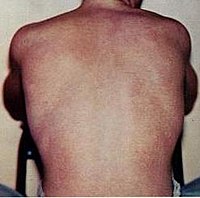
Photo from wikipedia
γδ T cells are innate cells able to quickly eliminate pathogens or infected/tumoral cells by their antiviral and adjuvancy activities. The role of γδ T cells during Dengue Viral Infection… Click to show full abstract
γδ T cells are innate cells able to quickly eliminate pathogens or infected/tumoral cells by their antiviral and adjuvancy activities. The role of γδ T cells during Dengue Viral Infection (DENV) infection is not fully elucidated. Nevertheless, human primary γδ T cells have been shown to kill in vitro DENV-infected cells, thus highlighting their possible antiviral function. The aim of this work was to characterize the phenotype and function of Vδ2 T cells in DENV patients. Fifteen DENV patients were enrolled for this study and peripheral blood mononuclear cells (PBMC) were used to analyze Vδ2-T-cell frequency, differentiation profile, activation/exhaustion status, and functionality by multiparametric flow cytometry. Our data demonstrated that DENV infection was able to significantly reduce Vδ2-T-cell frequency and to increase their activation (CD38 and HLA-DR) and exhaustion markers (PD-1 and TIM-3). Furthermore, Vδ2 T cells showed a reduced capability to produce IFN-γ after phosphoantigenic stimulation that can be associated to TIM-3 expression. Several studies are needed to depict the possible clinical impact of γδ-T-cell impairment on disease severity and to define the antiviral and immunoregulatory activities of γδ T cells in the first phases of infection.
Journal Title: Viruses
Year Published: 2022
Link to full text (if available)
Share on Social Media: Sign Up to like & get
recommendations!